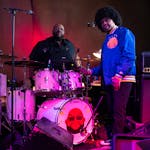In "Arrows Into Infinity," the award-winning 2012 documentary about the music and life of Charles Lloyd (directed by his wife, Dorothy Darr), the veteran jazz saxophonist describes his music as having "danced on many shores."
Indeed, among his many accomplishments, Lloyd was a pioneer in the world music movement, incorporating music from other cultures into his compositions as early as the late 1950s. Working with the Texas-born drummer Eric Harland and the Indian percussionist Zakir Hussain, Lloyd set up camp on one of those shores Thursday night at the Dakota Jazz Club, re-creating "Sangam," the 2006 album he made with these musicians, in which jazz, funky tunes, contemplative drones and even a touch of poetry collaborate with Indian music.
The performance was the first installment in Lloyd's four-night engagement at the Dakota, seven concerts in all, a tribute to the saxophonist just a few days before his 80th birthday on March 15. This can only be called a major event in jazz — or in any kind of music.
The format is impressive. Lloyd appears with three different ensembles: There was Indian music on Thursday, an outing with Lloyd's band the Marvels featuring guitarist Bill Frisell and singer Lucinda Williams Friday and Saturday, and a Sunday finale with what Lloyd calls his New Quartet with pianist Jason Moran, bassist Reuben Rogers and Harland again on drums.
Thursday's concert — a 100-minute set — was full of surprises. Though he walked slowly and carefully onto the stage, Lloyd proved to as charismatic as ever. Wearing a well-worn sport jacket, his long gray hair poking out from under a wool cap, Lloyd looked like an elderly beatnik out for a stroll, prepared to recite a poem on a street corner. What he did, in fact, recite were passages from the Bhagavad Gita over a soft drone. (Lloyd is a longtime student of the Vedanta school of Hinduism.)
There is little suggestion of age in Lloyd's playing. His sound on tenor sax remains unique — light, soft and lyrical, more forceful when he builds to a climax. He has always tipped his hat to Lester Young and, yes, his solos flow and expand with a clear sense of structure in the Young manner. But Lloyd's range is much wider. And, of course, he has other instruments in his bag.
On flute Lloyd delivered delicate arabesques during several numbers Thursday night, and on "Dancing on One Foot" (off the "Sangam" album) he played a deft solo on the tárogató, a Hungarian clarinet. He played a couple of wistful piano solos, too, and at one point he and Harland stood at the piano playing a duet, Lloyd hitting keys and Harland plucking strings. Later, with Harland at the piano, Lloyd sat down at the drum kit and picked up the rhythm using brushes on the snare drums.
Harland seemed genuinely surprised when Lloyd started playing drums. But this was the feeling — the tenor — of the entire evening: three musicians totally in tune with each other, trusting each other, listening hard and feeling free to evolve new patterns spontaneously. This doesn't happen very often on any stage. ("Sangam," appropriately. means confluence or meeting place.)
It was clear, too, that this is a real trio, not simply two percussionists accompanying the leader. The intricate interplay between Harland on drums and Hussain on tablas was vivid and subtle, so quick at times the ear couldn't hear it all. Hussain's singing, evoking plaintive incantations around a campfire, brought color and atmosphere to music that suggested a dimension of spirituality not often encountered in musical performance of any sort.
Michael Anthony is a Minneapolis writer.






